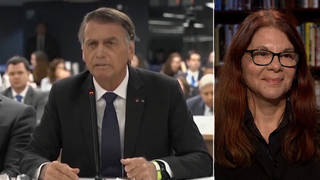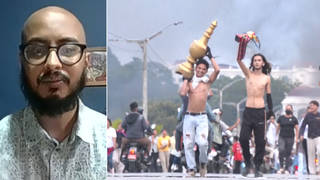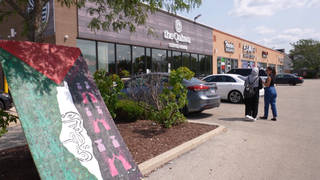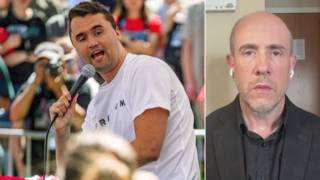
Guests
- Robin Rue SimmonsEvanston city councilmember and reparations advocate.
- Dino Robinsonfounder and executive director of Shorefront Legacy Center, the only community archive for Black history on Chicago’s suburban North Shore.
- Danny Gloveractor, director and activist. He is a member of the National African American Reparations Commission and United Nations ambassador for the Decade for People of African Descent.
Evanston, Illinois, has become the first city in the United States to make reparations available to its Black residents for past discrimination and the lingering effects of slavery. The Chicago suburb’s City Council voted 8 to 1 to distribute $400,000 to eligible Black households, with qualifying residents receiving $25,000 for home repairs or down payments on property. The program is being funded through donations and revenue from a 3% tax on the sale of recreational marijuana, and the city has pledged to distribute $10 million over 10 years. “There’s no way to express how significant this is,” says Danny Glover, an actor and activist who is a member of the National African American Reparations Commission. “Imagine how that resonates beyond Evanston, Illinois. Imagine the kind of discourse that happens, the discussions in community by ordinary citizens about reparations.” We also speak with Robin Rue Simmons, a member of the Evanston City Council and reparations advocate, and Dino Robinson, a historian and executive director of the Shorefront Legacy Center, the only community archive for Black history on Chicago’s suburban North Shore.
Transcript
AMY GOODMAN: This is Democracy Now!, democracynow.org. I’m Amy Goodman.
We end today’s show in Evanston, Illinois, where the City Council has agreed to pay Black residents reparations for historic housing discrimination, making it the first U.S. city to adopt such a measure. In the first phase, the city will distribute some $400,000 to up to 16 families to be used toward housing-related costs. The city has committed to distribute $10 million over the next decade. For decades, Black residents of Evanston were subjected to redlining, which prevented them from obtaining bank loans to purchase property. This comes as civil rights groups are pushing for slavery reparations at a national level.
Still with us, actor and activist Danny Glover, who serves on the National African American Reparations Commission. In 2019, he testified before the House in favor of reparations. He has also supported the reparations effort in Evanston. We’re also joined by Evanston City Councilmember Robin Rue Simmons, who led the reparations effort, and Dino Robinson, founder and executive director of Shorefront Legacy Center. He co-authored a report commissioned by Evanston officials on city policies and practices affecting Black residents from 1900 to 1960 and through to the present day.
We’re going to begin right now with Robin Rue Simmons, city councilmember. Can you talk about what you have just passed and the significance of it?
COUNCILMEMBER ROBIN RUE SIMMONS: Absolutely. And thank you for having us this morning.
What we passed, actually, was in 2019, a resolution to provide reparations to Black Evanston residents. We passed it with funding from our cannabis sales tax, with an initial commitment of $10 million. And what we passed on this last Monday was the first disbursement or the first remedy, which is going to be in the form of a housing remedy, $25,000 direct benefit to eligible Black residents for home equity, home wealth, acquisition or purchase, any type of improvement, but something that will build wealth through home equity. And I have to say that in 2002, under the leadership of Judge Lionel Jean-Baptiste, who was the 2nd Ward alderman at the time, our city passed a resolution in support of H.R. 40. So, we’ve been working towards this for some time in Evanston.
AMY GOODMAN: Who gets the money? Can you explain what residents get it, what don’t, who doesn’t —
COUNCILMEMBER ROBIN RUE SIMMONS: Sure.
AMY GOODMAN: — and what programs get it?
COUNCILMEMBER ROBIN RUE SIMMONS: Sure. So, our reparation eligibility is for Black residents that lived in Evanston between 1919 and 1969 and their direct descendants. You can learn more about that report at our CityofEvanston.org/reparations. It’s over a 100-page report. And Dino can tell you more about that. But that time period is significant, because not only redlining, but, more specifically, the anti-Black housing policies that were enforced by the city of Evanston specifically. This is an Evanston-specific reparation policy, so it was important that our case for reparation was based on policies that were enforced by Evanston.
AMY GOODMAN: This is Delois Robinson, whose family was subject to the racist practice of redlining in Evanston.
DELOIS ROBINSON: My great-grandmother, who was in Evanston — I guess she probably been here since the late '30s, early ’40s. And she was a business owner. And the redlining affected her and her husband, because they were trying to open a business in a well-established area of Evanston. When I say “well-established,” where it would be all types of nationalities that come through that area. But she was forced to just stay in one certain area, to the point of she had to have the restaurant in her home. … It kind of deals with your self-esteem. And so it's a thing of: Am I good enough to be able to stand on my own and say, “No, I want property here,” or “I want to cross the redlining”?
AMY GOODMAN: So, I want to turn to Dino Robinson now, founder and executive director of the Shorefront Legacy Center, the only community archive for Black history on Chicago’s suburban North Shore, lifelong Evanston resident, who co-authored a 77-page report, commissioned by Evanston officials, on city policies and practices affecting Black residents. Can you talk about what this means for your family and for your community? And specifically, talk about the policies that were so discriminatory that are leading to reparations, Dino.
DINO ROBINSON: Sure. Thank you for this opportunity.
When the city commissioned myself and my colleagues to work on this report, we wanted to highlight our years of research, our own research, that showcased these different discriminatory practices and put it into one document. Once the 2019 passing of the resolution happened, we started getting inundated with phone calls and emails looking for information. So, this important document was helpful in disseminating the information that was needed to help support the reparations movement.
What we saw in our report were like a series of patterns, where at one time in Evanston’s history there was no, like, Black community as a one area. Everybody lived everywhere. But distinctly, after 1900, you could see patterns where Black families were forced to live in certain areas of Evanston. It started with zoning ordinances, and then further supported with the HOLC maps for redlining, further supported by land clearance ordinances in the 1940s, as well, that greatly impacted families — Black families and generational Black families that lived in Evanston. And this report showcases that. And how this report helps and this reparations program helps is one step in helping to remedy the past atrocities that happened against the Black community throughout Evanston’s history.
As far as my family is concerned, as alluded to earlier, you know: Who does this help? It is a specific segment of the Black population that have longtime generational impact here in Evanston. I, myself, am more or less a newcomer to Evanston. So, in this parameter that’s set up right now, my family does not benefit from it. But I do believe that this program that is set forth is very helpful for the generational families that have been here.
AMY GOODMAN: Interestingly, Jacob Blake, who was shot by police officers seven times in the back in Kenosha, Wisconsin, isn’t it true, Dino Robinson, his grandfather, Jacob Blake, Reverend Jacob Blake, was seminal during the civil rights battles of the 1960s, and there’s a manor named for him there, Jacob Blake Manor?
DINO ROBINSON: Yes, absolutely. He was very instrumental during the '60s, fighting against predatory real estate agencies' work toward steering Black families into one area of Evanston and denying rental or homeownership in other parts of Evanston that were predominantly white. In our archives at Shorefront, we have recordings from oral histories that I’ve recorded over the last 25 years, families talking about experiences with racial discrimination and real estate agencies who would not rent or lease homes to Black families outside of the designated area that’s known now as the 5th Ward.
AMY GOODMAN: Danny Glover, can you talk about how you got involved with this? You were back in Evanston in 2019. You were speaking up for this reparations bill. You’ve spoken next to Ta-Nehisi Coates in Congress for reparations. How significant is this?
DANNY GLOVER: Well, I mean, we can’t tell you how. I mean, there’s no way to express how significant this is. This is part of the multiplicity of expressions by local communities. I mean, and we’ve talked about this on a local level. Imagine how that resonates beyond Evanston, Illinois. Imagine the kind of discourse that happens, the discussions in community by ordinary citizens about reparations. Yes, amazingly, N’COBRA has played an extraordinary part, as well. But you have Sir Hilary Beckles for CARICOM is studying the whole idea of reparations as a regard to those CARICOM countries and the colonizer that extracted wealth from them. So you have that on the one hand.
But we don’t have anything on the national level. We can get these small examples, but which has to be supported by the actions. Is action simply a study? H.R. 40, introduced by John Conyers, a democratic socialist, introduced by him when he came to Congress every year, has to be the most responsible thing that we can do on the federal level, because what it will do — what will happen is you will have a multiplication of expressions. And then, within that, we figure out what works, what doesn’t work, what are the things that we need to shape and reshape about it — all these. But if it becomes public discussion. And that’s what is happening in Evanston, Illinois, right now.
AMY GOODMAN: Speaking of the racial wealth gap, I want to give you one example. The median net worth of Black families in Boston is just $8. The median net worth of white families in Boston? $250,000 — nearly 31,000 times as much. Boston’s new mayor, Kim Janey, is the city’s first Black mayor, the first woman mayor, has vowed to address this. But weave this into what we’re seeing in Evanston now, Danny.
DANNY GLOVER: Oh, I’m sorry. You were saying what now? I’m sorry.
AMY GOODMAN: Just the wealth gap, so massively different.
DANNY GLOVER: Well, of course. You know, I was just thinking about — what did Martin Luther King say? One of the best anti-poverty program was a union. It’s certainly an expression of this wealth gap, which is real. How do we put our minds around that? What are the things that we do around that? Certainly, reparatory justice or reparations is a way of now correcting the ills that have been done in the past, historically been done in the past. So, that is another question that we have to grapple with, you know, when we talk about — because so much attention is given to this wealth gap. But at the same time, we know that there’s poverty. You know, there’s poverty among not only Brown, Black and poor white, as well. So, how we address the issue and talk about the wealth gap, as we see what is happening to this system, this economic system, as a result of COVID, the impact that it has on those who have traditionally and historically been cut out of the system, what does it mean now for the whole country itself?
AMY GOODMAN: Finally, Robin Rue Simmons, it hasn’t been determined, the total use of the $10 million. You’re going to be holding a series of public hearings. Can you talk about what you think will happen? And also, have many cities around the country gotten in touch with you now?
COUNCILMEMBER ROBIN RUE SIMMONS: Thank you. So, we started with a public process to get to this initial commitment of a housing remedy. And we will continue. As you stated, we’ve only identified the first 4% of our $10 million fund. And I want to add that that fund is growing, by the buy-in from our stakeholder and our ally community, as well as businesses and houses of worship that have been contributing to the fund, as well.
So, we will continue with the public process, stakeholder participation, and giving the reparation committee direction on what they believe remedy is for the Black community in Evanston. Of course, we’ll have to do that in line with our purview as a municipal government and in line with our local case for reparations, which has been developed by Shorefront Legacy Center and Dino’s team. But one thing that will continue to remain a process is our national partners, namely N’COBRA. N’COBRA has supported our community —
AMY GOODMAN: Five seconds.
COUNCILMEMBER ROBIN RUE SIMMONS: — by participating in leading and educating our residents, and we’re really grateful. But we will continue with the public process to determine the next $9,600,000 plus.
AMY GOODMAN: Well, I want to thank you so much for being with us, Evanston City Councilmember Robin Rue Simmons, Dino Robinson of the Shorefront Legacy Center, and Danny Glover, actor and activist. Have a safe trip from Vancouver to Bessemer, Alabama, today.
That does it for our show. A very Happy Birthday to Nermeen Shaikh! I’m Amy Goodman. Wearing a mask is an act of love. Wear two.












Media Options